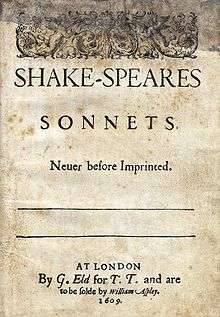Procreation sonnets
The procreation sonnets are Shakespeare's sonnets numbers 1 to 17.
Although Sonnet 15 does not directly refer to procreation it forms a diptych with sonnet 16 which does and is thus fully part of the sequence.
They are referred to as the procreation sonnets because they all argue that the young man to whom they are addressed should marry and father children, hence procreate. Throughout the procreation sonnets, Shakespeare usually argues that the child will be a copy of the young man, who will therefore live through his child.
The actual historical identity of the man to whom they were written is a mystery, but the most frequently suggested individuals are Henry Wriothesley (W.H. backwards), and William Herbert, 3rd Earl of Pembroke. If the latter, it has been suggested that the 17 sonnets correspond in number to Herbert's age at the time.
Sonnet 18 ("shall I compare thee to a summer's day") changes the tone dramatically towards romantic intimacy.
